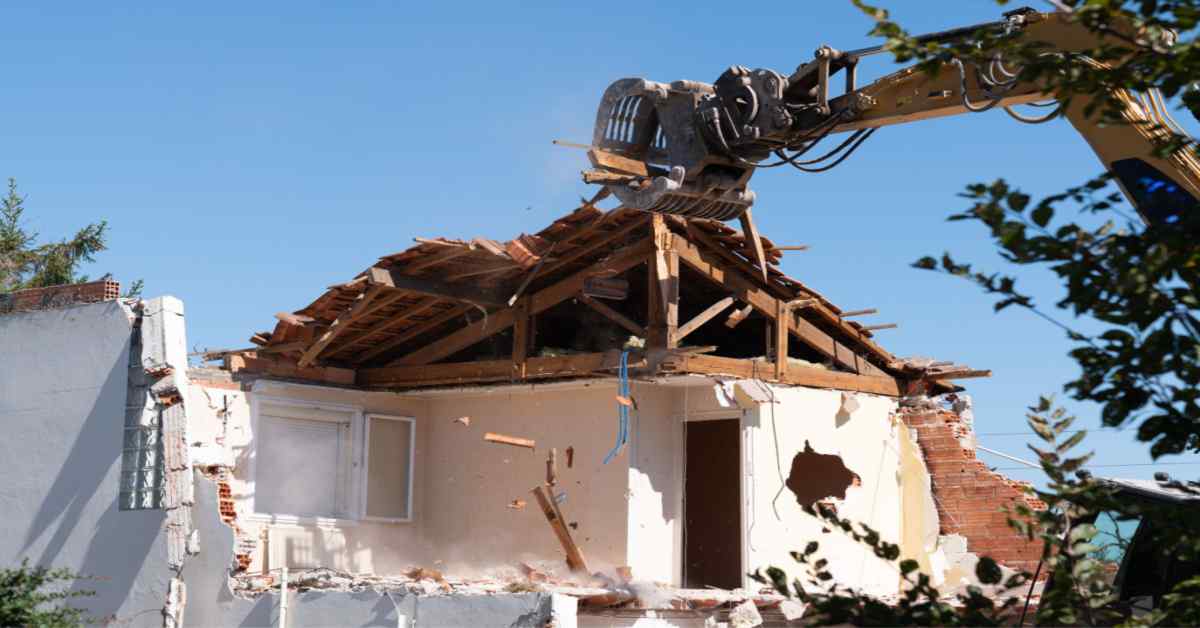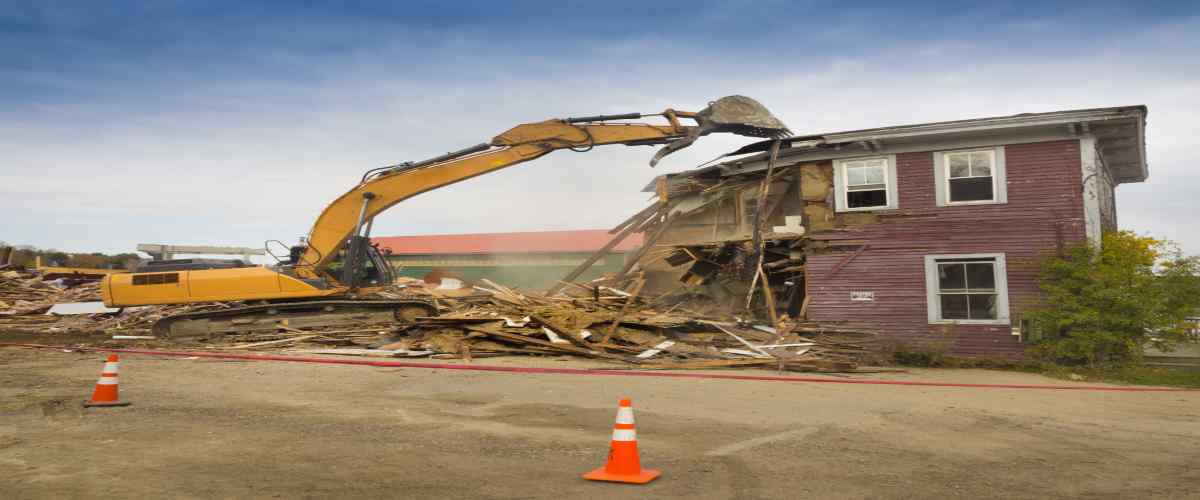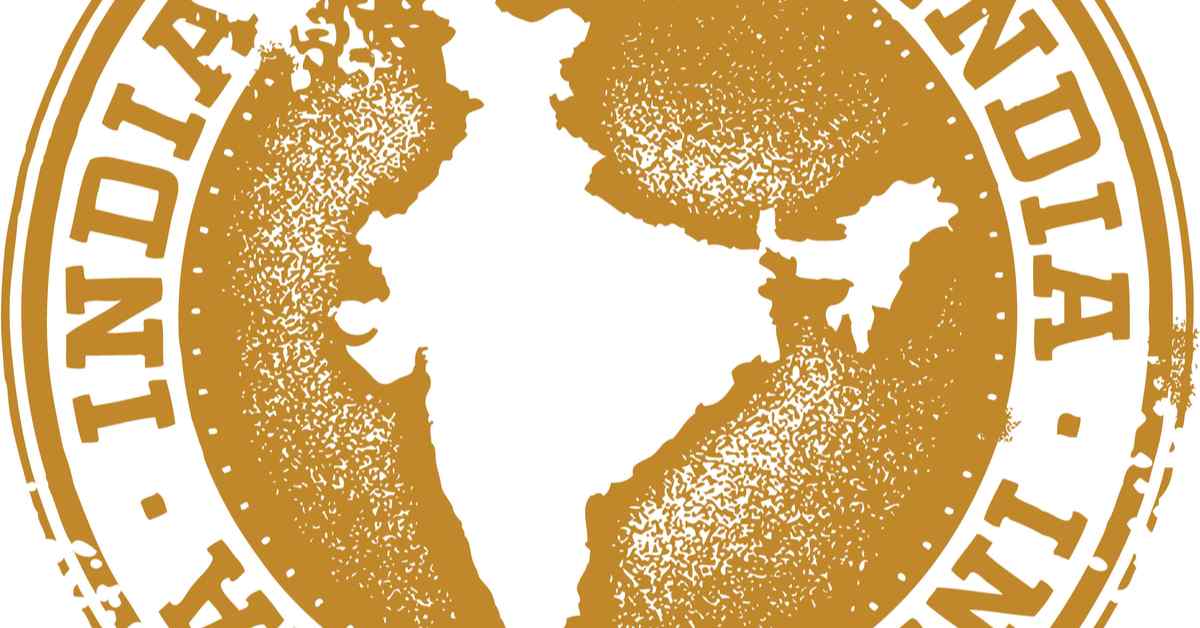Table of Contents
Quality Service Guarantee Or Painting Free

Get a rental agreement with doorstep delivery

Find the BEST deals and get unbelievable DISCOUNTS directly from builders!

5-Star rated painters, premium paints and services at the BEST PRICES!
Loved what you read? Share it with others!

All you need to know about Home Demolition in India
Table of Contents
Home demolition is a complex and sensitive topic in India, as it can have significant impacts on the safety, cost, and legality of a property. Individuals and communities need to understand the process of home demolition, including the cost to demolish a house, safety measures for the demolition of buildings, and the documents required. This blog aims to provide information and guidance for those considering the demolition of their own home, as well as the process of demolition as part of a renovation or rebuilding project. Additionally, this blog will also discuss the laws and regulations surrounding building demolition in India, and the process of obtaining permits and approvals from the government's perspective.
How Building Demolition Works
Home demolition refers to the process of tearing down an existing building or structure. It can be done for a variety of reasons, including safety concerns, the need for redevelopment or expansion, or the purpose of building a new structure.

Reasons Why Homes may be Demolished in India:
Why do houses get demolished? Building demolition in India is done for a variety of reasons, including safety concerns, the need for redevelopment or expansion, or the purpose of building a new structure. There isn't a single, central "Demolition Act" in India. Demolition procedures are governed by various laws, primarily at the state level. Additionally, homes may be demolished as part of government policies or programs related to urban renewal, slum clearance, or infrastructure development. Some of the most common reasons that bring into action the code of practice for demolition of buildings include:
Quality Service Guarantee Or Painting Free

Get a rental agreement with doorstep delivery

Find the BEST deals and get unbelievable DISCOUNTS directly from builders!

5-Star rated painters, premium paints and services at the BEST PRICES!
- Government-led redevelopment projects: In many Indian cities, the government may undertake redevelopment projects to improve infrastructure and housing conditions. In these cases, homes may be demolished to make way for new construction.
- Illegal construction: Many homes in India are built without proper permits or in violation of zoning regulations. These homes may be demolished by the government as a means of enforcing building codes and regulations.
- Slum clearance: India has a significant population living in slums, and many of these homes are in poor condition and lack basic amenities. The government may undertake slum clearance projects to improve living conditions and provide better housing options for residents.
- Natural disasters: Homes in India are often vulnerable to natural disasters such as floods, earthquakes, and landslides. In the event of a natural disaster, homes may be demolished to ensure the safety of residents and to prevent further damage.
- Urbanization: India's population is rapidly urbanizing, and many rural residents are moving to cities in search of better job opportunities. This urbanization has led to an increase in the demand for housing, and many homes may be demolished to make way for new construction.
- Land acquisition: Many private companies and government departments acquire land for various reasons like Construction of roads, public transportation, and industrial projects. This leads to the demolition of homes and displacement of people.
- Heritage conservation: In India, many cities have a rich cultural and architectural heritage. Some homes may be demolished to preserve and restore heritage buildings and sites.
- Poor maintenance: Many homes in India are in poor condition due to lack of maintenance and repair. In such cases, homes may be demolished to ensure the safety and well-being of residents.
- Non-payment of taxes: Many property owners in India do not pay their property taxes, and as a result, the government may take action to seize and demolish the property.
- Private disputes: Homes may be demolished as a result of private disputes, such as land disputes or inheritance disputes.
Therefore, there are several reasons why homes may be demolished in India, and it is important for the government, private sector and citizens to work together to ensure that the process is carried out in a fair and just manner, and with the least disruption to the lives of the people affected.
The Legal Framework for Home Demolition in India

The legal framework for home demolition in India is complex and varies by state. The central government has laws and regulations in place to regulate and implement home demolition, such as the Building and Other Construction Workers Act, 1996 and the National Building Code of India, 2005. However, the implementation and enforcement of these laws is primarily the responsibility of the state governments.
Government Policies and Programs related to Home Demolition in India
The central and state governments in India have a variety of policies and programs related to home demolition. These include urban renewal and slum clearance programs, as well as infrastructure development projects. These programs often involve the acquisition and demolition of homes and communities and can have significant impacts on the residents and families affected.
Given that home demolition is a serious issue in India, the government has implemented several policies and programs to address it. One of the main reasons for home demolition in India is the need for urban development, as cities continue to grow and expand. Understanding the rules for demolishing a house in India requires consulting your state's specific regulations alongside relevant central acts.
- One of the main policies related to home demolition in India is the Right to Fair Compensation and Transparency in Land Acquisition, Rehabilitation and Resettlement Act, 2013. This act lays out the procedures and rules for land acquisition, compensation, and rehabilitation of displaced persons. Under this act, the government is required to provide fair compensation to residents whose homes are demolished, and to resettle them in a suitable location.
- The government has also implemented the Pradhan Mantri Awas Yojana (PMAY), which aims to provide affordable housing to citizens. Under this program, the government provides financial assistance to people whose homes have been demolished, to help them rebuild or purchase a new home. The PMAY also provides interest subsidies on home loans, making it easier for people to afford a new home.
- In addition to these policies and programs, the government has also implemented several schemes to provide financial assistance to people who have been affected by home demolition. The Indira Awaas Yojana, for example, provides financial assistance to families living below the poverty line, to help them build or repair their homes. The government also provides assistance through the National Rural Employment Guarantee Act, which provides employment to people in rural areas, including those affected by home demolition.
- Another important initiative is the creation of the National Urban Livelihoods Mission (NULM) which aims to provide support for the urban poor and for those who have been affected by home demolition and displacement. The mission provides financial assistance, skill development training and other support for livelihood activities. The government has also implemented policies and programs to ensure that residents affected by home demolition are properly informed and consulted before their homes are demolished. The government is required to give notice to residents before their homes are demolished and to provide them with information about the compensation and resettlement process.
Overall, the government of India has implemented several policies and programs to address the issue of home demolition and ensure that residents are properly compensated and resettled. Despite these policies and programs, home demolition remains a serious issue in India. Many residents affected by home demolition have reported that they have not received fair compensation or adequate resettlement. The government needs to ensure that these policies and programs are properly implemented and that residents affected by home demolition are properly compensated and resettled. However, there are still challenges to be addressed and it's important for the government to ensure that these policies and programs are properly implemented and that residents affected by home demolition are properly compensated and resettled.
The Role of Private Developers in Home Demolition in India

Private developers also play a significant role in home demolition in India. They may acquire and demolish homes for a variety of reasons, such as to build new structures or to develop land for commercial or residential purposes. The motivations and practices of private developers in acquiring and demolishing homes can be complex and can have significant impacts on the communities and individuals affected. Local regulations and oversight can play an important role in limiting the power of private developers and protecting the rights of affected communities.
International Perspectives on Home Demolition in India:
Home demolition practices in India can be compared to those in other countries. International organizations and NGOs can play a role in addressing home demolition in India and advocating for the rights of communities affected by it. There is also a potential for global solidarity and support in addressing the issue of home demolition in India.
Steps Involved in Home Demolition in India

The methods of demolition of buildings in India may vary depending on the specific location, building demolition techniques and circumstances, but generally, the process would involve the following:
- Obtaining necessary permits on building demolition plans and approvals from local authorities, such as the Municipal Corporation or the Urban Development Authority.
- Hiring a licensed and experienced demolition contractor who will be responsible for the safe and proper execution of the demolition work.
- Planning and preparation, including making sure the area is cleared of any occupants and personal belongings, disconnecting utilities and services and preparing the site for demolition.
- Demolition, can be done manually or with heavy machineries, such as excavators and bulldozers.
- Clean-up and disposal of debris in case building demolition explosives are used, which must be done in accordance with local regulations and environmental guidelines.
- Restoration of the site, including levelling and grading the land, and possible construction of new buildings or infrastructure.
It is important to note that the laws and regulations regarding home demolition in India may vary from state to state and municipality to municipality. It is always best to consult the local authorities for guidance and to ensure that all necessary permits and approvals are obtained before proceeding with the demolition.
Home demolition is a complex and sensitive issue in India, with significant impacts on the safety, cost, and legality of a property. It is important for individuals and communities to understand the process of home demolition, including the cost to tear down and rebuild house, safety measures, and the documents required for building demolition. Additionally, it is important to understand the laws and regulations surrounding building demolition in India, and the process of obtaining permits and approvals from the government's perspective. The role of private developers in home demolition in India is also an important aspect to consider, and can have significant impacts on the communities and individuals affected. Finally, it is important to consider the international perspectives on home demolition in India, and to advocate for the rights of communities affected by it.
In case you need any legal support for any house demolition or real estate issues, be sure to check out NoBroker Legal Services. In case you are looking to design a new home, our top-starred interior designers will be best suited to help you. If you are looking for a new home in place of a demolished house as well as get help for selling it to the highest bidders, again, the NoBroker Rent, Buy, Sell platform will be best suited to your needs. Be sure to check them out!

FAQ's
Ans: The specific requirements for obtaining a permit for home demolition in India may vary depending on the location and circumstances, but generally, you will need to submit an application to the local Municipal Corporation or Urban Development Authority, along with relevant documents such as property ownership papers, building plans and site maps, and an environmental impact assessment report.
Ans: Safety precautions that must be taken during home demolition in India include ensuring that the area is cleared of any occupants and personal belongings, disconnecting utilities and services, and preparing the site for demolition. The building demolition contractors should also have a safety plan in place and use appropriate personal protective equipment and safety measures to protect workers and the public during the demolition process.
Ans: The process of home demolition in India generally involves obtaining necessary permits and approvals, hiring a licensed and experienced demolition contractor, planning and preparation, demolition, clean-up and disposal of debris, and restoration of the site.
Ans: It is recommended to hire a professional demolition contractor for home demolition in India as they have the necessary experience and equipment to safely and effectively execute the demolition process. They also have the knowledge of local laws and regulations and ensure that the demolition is done in compliance with them.
Ans: Regulations for disposing of debris from home demolition in India may vary depending on the location, but generally, the debris must be disposed of in accordance with local regulations and environmental guidelines. This may involve sorting and separating materials for recycling or proper disposal, and ensuring that the site is cleaned and restored to a safe and stable condition.
Recommended Reading

Franking Charges Explained: Meaning and Benefits
January 31, 2025
1116855+ views

Rectification Deed Format and Process in India 2025
June 1, 2025
135779+ views

Revenue Stamp in India: Meaning, Types, Uses, Legal Value & Where to Buy in 2025
January 31, 2025
131920+ views

How to Get a Stay Order in India: Step-by-Step Legal Process in 2025
May 31, 2025
96622+ views

FSI in Mumbai 2025: Calculate FSI in Mumbai Municipal Corporation
January 31, 2025
94624+ views
Loved what you read? Share it with others!
Most Viewed Articles

Franking Charges Explained: Meaning and Benefits
January 31, 2025
1116855+ views

Society Maintenance Charges : Meaning, Cost, Types and Calculation
January 31, 2025
200659+ views

BBMP E-Khata Registration process for property owners in Bangalore, Karnataka in 2025
March 19, 2025
145603+ views

Daughter's Right in Fathers' Property - the Law is Finally Equal for both Genders?
June 1, 2025
145316+ views

Rectification Deed Format and Process in India 2025
June 1, 2025
135779+ views
Recent blogs in
What Is Cidco Lease Deed: Types, Tenure, Rights and Responsibilities in India 2026
February 20, 2026 by Ananth
Perpetual Lease Deed: Meaning, Rights, Benefits and Registration Process in India 2026
February 20, 2026 by Vivek Mishra
Ground Lease Vs Land Lease: Meaning, Key Features and Legal Distinctions in 2026
February 20, 2026 by Vivek Mishra
Lease Extension Agreement: Required Documents, Cost and Registration in India 2026
February 20, 2026 by Ananth








 Full RM + FRM support
Full RM + FRM support
Join the conversation!